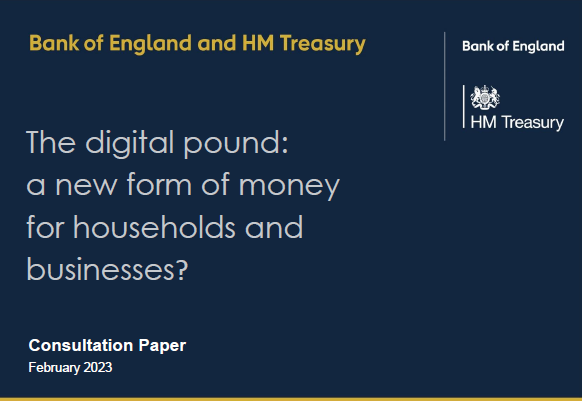Published on 15th May 2023
We have responded to this consultation, although it is a sham.
You can download our response here.
The points on which the Bank of England has chosen to consult are narrow, and avoid the most important questions about the ‘digital pound’, which can only be referred to tangentially in a response.
This is because the Bank of England views this matter as reserved to itself, and it is enjoying its total autonomy from political control, established when Rishi Sunak and Jeremy Hunt exculpated the Bank from blame for the financial turmoil of September 2022. Two factors were equally at play in that turmoil: the Bank’s failure to raise interest rates in line with the Federal Reserve and the Bank’s myopia to the risks residing in Liability-Driven Investments (aka naked gambling on interest rates) held by UK pension funds.
The Bank’s narrative was that the Mini-Budget unveiled by Kwasi Kwarteng and with the support of Liz Truss was solely to blame. That narrative propelled Sunak and Hunt into office, and, as a quid pro quo, the Bank has been permitted to make a one-way declaration of independence: independence from the citizenry and their elected representatives when the Bank views a matter as solely within its discretion, but not independent when the Bank wants to present its bill (up to £200 billion) to the citizens for its mistakes in its Quantitative Easing programme.
The Bank is genuinely not interested in the views of citizens and the businesses that citizens run, regarding a matter that will profoundly rebalance the relationship between the citizen and the authorities that supposedly act at citizens’ behest – to the citizen’s detriment. The voice of the citizen needs therefore to be muzzled in substance, though not ostensibly in form.
A ‘sham’ consultation is the vehicle for that manoeuvre and is in itself indicative of the proposed increase in the power of the governing.
The fundamental shift in the relationship between the governing and the governed is that all financial transactions will be visible and on-the-ledger. There can be no financial privacy once that has occurred.
The ‘sham consultation’ approach falls far short of the necessary scope and level-of-seriousness appropriate to this matter.
The consultation even whitewashes the evidence it has itself collected, in the form of the YouGov surveys. These showed payment habits, desires and preferences to which the digital pound does not respond, so they are airbrushed down to a minimum.
As we have proved in our examination of those surveys, there was huge support for physical cash, branch networks are very important to citizens and businesses, and the usage of digital services has hardly changed for years: looking at a bank account online.
What has changed is the fear of Authorized Push Payment Fraud – a detriment that the authorities and the payment industry have failed to eradicate – and that taking payment by card is not businesses’ favoured method of receiving payments, because they receive far less than the face value of the sale.
The Bank of England’s plan for the ‘digital plan’ will allow the same intermediaries that gouge so much from card payments to do the same on payments currently made in physical cash.
The Bank of England’s contention that physical cash will be unaffected has to be taken with a pinch of salt. The same amount issued as ‘digital pounds’ must be withdrawn from circulation as physical pounds or ‘scriptural money’ (customers’ account balances with banks, building societies and so on), or the Money Supply increases, which causes inflation.

